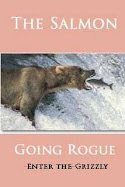I have often had a fancy for writing a romance about an English yachtsman who slightly miscalculated his course and discovered England under the impression that it was a new island in the South Seas. I always find, however, that I am either too busy or too lazy to write this fine work, so I may as well give it away for the purposes of philosophical illustration.Chesterton of course was using the man in the yacht to illustrate his sailing away from what he thought he knew in search of what was missing in his faith only to rediscover it right where he left it, within himself and the 2000 year old teachings of the church; the Apostles Creed being the central tenet.
There will probably be a general impression that the man who landed (armed to the teeth and talking by signs) to plant the British flag on that barbaric temple which turned out to be the Pavilion at Brighton, felt rather a fool. I am not here concerned to deny that he looked a fool. But if you imagine that he felt a fool, or at any rate that the sense of folly was his sole or his dominant emotion, then you have not studied with sufficient delicacy the rich romantic nature of the hero of this tale.
His mistake was really a most enviable mistake; and he knew it, if he was the man I take him for. What could be more delightful than to have in the same few minutes all the fascinating terrors of going abroad combined with all the humane security of coming home again? What could be better than to have all the fun of discovering South Africa without the disgusting necessity of landing there? What could be more glorious than to brace one's self up to discover New South Wales and then realize, with a gush of happy tears, that it was really old South Wales?
I steal this philosophical illustration from Chesterton only to suggest that Americans in general and conservatives in particular have taken a similar voyage of discovery. I won’t venture to pinpoint today exactly where and when we embarked on this voyage, if that is even possible with any exactitude, or expound on how and why we drifted so far off course. It is safe to say however that the vessel has been pushed to and fro by a variety of forces both internal and external but like Chesterton’s yachtsman we today find ourselves coming full circle.
Now you may be saying to yourself that this was a strictly religious analogy and you certainly could not apply to the politics of today. I don’t feel it is a leap to argue that America was uniquely founded on a particular creed (some have gone so far to call it a civil religion to the ire of others) with the Declaration of Independence the central tenet.
I also don’t feel it is a leap to argue that we are seeing an upsurge that is re-asserting this creed into American politics with the Tea Party movement the most visible example. Less obvious is the shift in the message of conservative politicians who have embraced practical conservative values without the religious conservative baggage. We are also witnessing a growing turmoil within the liberal coalition as voters flee a vision bereft of historical American values.


_edited-1.jpg)




4 comments:
Insightful and not a stretch...
Thanks.
Time permitting I may try to expand on this train of thought sometime soon.
Very insightful, Scott.
I think you're right about conservatism has come back home to itself.
Great job.
Post a Comment